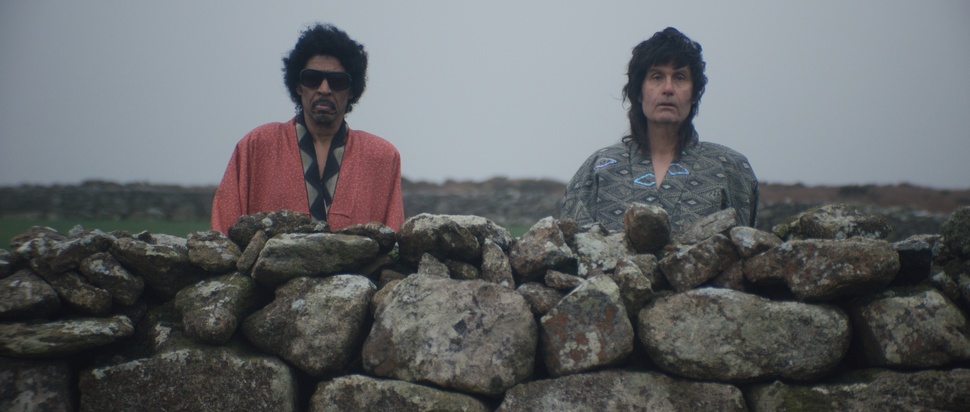Imperfect Harmony: Jim Hosking on Ebony & Ivory
With his knack for combining the bizarre with the poignant, Jim Hosking has proven himself a one-off in British cinema. We chat to him about his latest cult film in the making, Ebony & Ivory, ahead of its UK premiere at Glasgow Film Festival
Paul McCartney pouts across a grey sea at an approaching rowing boat. Some mysterious figure clambers off, with three suitcases in his arms and a fur coat around his shoulders. It’s only Stevie Wonder, who has paddled across from America intent on a visit to Paul at his cottage on the Mull of Kintyre. So opens Jim Hosking's Ebony & Ivory.
From the title, you might surmise this was a film about the making of McCartney and Wonder's trite 1982 duet of the same name, where the black and white keys of a piano become a reductive metaphor for a racial utopia. “I wasn’t really thinking about the song,” Hosking accepts over Zoom, in a barnstormer of an understatement. “It’s just a springboard for an examination of two people who have nothing in common [and putting them] in close proximity.” He’s a man of his word. The titular platitudinous ballad, and indeed the fact that these are two of the most famous and beloved musicians of the 20th century, is far from front and centre in the film – only Sky Elobar as McCartney ever nods towards doing anything close to an impersonation, and that’s near indiscernible a lot of the time. Instead, Hosking's film follows the pair as they while away 48 hours: bickering, eating Linda’s veggie nuggets and trying to make Stevie’s perfect hot chocolate.
This disconnect between this surface absurdism and the self-importance of the pair's duet is a key part of the film's joy, but it isn’t without issue. One of Ebony & Ivory's earliest reviews went so far as to describe it (positively) as a kind of practical joke – a statement towards which Hosking expresses ambivalence. But the film will not surprise those already acquainted with this filmmaker's work. It bears many of the touchstones of his uncanny comedies: wilfully wonky performances, nightmarish tonal shifts and a joy of language that finds phrases being repeated and chewed up until they become both maddening and hysterical. More than anything though, it continues to mould supreme daftness with a total sincerity of craft.
“There are a lot of films that are taken very seriously when it feels to me that they’re quite calculating,” Hosking states. “They’re quite impersonal or cynical, and I’m maybe going against that with the desire to just express myself however it occurs to me; there’s joy to that.” I put it to Hosking that many of the worst offenders of the kinds of films he's referring to are the wave of awards-chasing music biopics that we have seen in the last few years, films with which Ebony & Ivory, however tangentially, shares some DNA. "I can’t really watch those,” he admits. “It’s way less interesting than watching a two-minute clip on YouTube of Freddie Mercury talking behind the scenes. I don’t believe in the veracity of biopics. The more that most films try to convince you of their earnestness, the less I believe in them somehow.” This is not an accusation you could make of Hosking’s films; their earnestness is sewn into their very existence, the sheer attention to detail in their worlds carrying with it an incredible warmth and care. It’s not the leap that it initially sounds when Hosking mentions Aardman animation as an early inspiration.
This isn’t how some audiences receive his films, however. His sublime feature debut The Greasy Strangler, in particular, with its hot dogs dipped in vats of grease and viscous gore, was taken with a degree of squeamishness, and critics ascribed it a kind of nihilistic shock value. That film's reputation slightly baffled Hosking. He had journalists asking him what his favourite gross-out film was without really knowing what that meant, while the influences he most related to were Steptoe and Son and the Krankies.
This idea of wilful shock seems particularly anathema to Hosking’s attitude. He simply describes himself as “trying to express myself in as pure a fashion as possible,” and says that “there’s absolutely nothing in this film that is a concession to an imagined audience, or to anybody else.” This seems a far truer maxim for Hosking’s films, and no more so than Ebony & Ivory. But, where that attitude can sometimes equate with a contempt for audiences, Hosking’s stems from a trust that he and the audience will connect in their eccentricities.
He adds at the end of our conversation that “there would be an easy way to talk about it to minimise its importance to me, but with everything I make I really pour myself into it fully.” For all the ascribed oddness or flippancy in his films, Hosking comes across simply as a filmmaker intent on making work as honestly and personally as possible.
Ebony & Ivory is released 19 Sep by Anti-Worlds, and on 26 Sep, Jim Hosking will attend a screening at Cameo in Edinburgh to present the film and take part in a Q&A after the screening. Tickets here
Ebony & Ivory had its UK premiere at GFT on 5 & 6 Mar as part of Glasgow Film Festival
